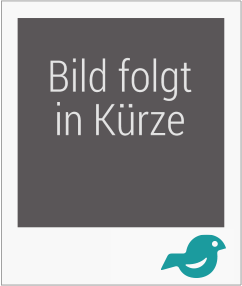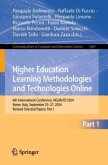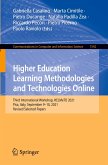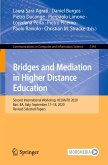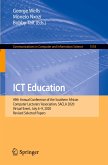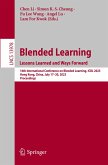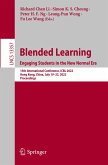Technology and Innovation in Learning, Teaching and Education
4th International Conference, TECH-EDU 2024, Abu Dhabi, United Arab Emirates, November 13-15, 2024, Revised Selected Papers, Part II
Herausgegeben:Reis, Arsénio; Cravino, José P.; Hadjileontiadis, Leontios; Martins, Paulo; Dias, Sofia B.; Hadjileontiadou, Sofia; Mikropoulos, Tassos
Technology and Innovation in Learning, Teaching and Education
4th International Conference, TECH-EDU 2024, Abu Dhabi, United Arab Emirates, November 13-15, 2024, Revised Selected Papers, Part II
Herausgegeben:Reis, Arsénio; Cravino, José P.; Hadjileontiadis, Leontios; Martins, Paulo; Dias, Sofia B.; Hadjileontiadou, Sofia; Mikropoulos, Tassos
- Broschiertes Buch
- Merkliste
- Auf die Merkliste
- Bewerten Bewerten
- Teilen
- Produkt teilen
- Produkterinnerung
- Produkterinnerung
The three-volume set CCIS 2479-2481 constitutes the proceedings of the 4th International Conference on Technology and Innovation in Learning, Teaching and Education, TECH-EDU 2024, held in Abu Dhabi, United Arab Emirates, during November 13 15, 2024.
The 79 full papers presented in this volume were carefully reviewed and selected from 167 submissions. The papers are organized in the following topical sections:
Part I: Artificial Intelligence in Education; Emerging Technologies and Learning Environments.
Part II: Open Education, Digital Resources and Online Assessment; Pedagogical and Curricular Innovation.
Part III: …mehr
Andere Kunden interessierten sich auch für
![Technology and Innovation in Learning, Teaching and Education Technology and Innovation in Learning, Teaching and Education]() Technology and Innovation in Learning, Teaching and Education57,99 €
Technology and Innovation in Learning, Teaching and Education57,99 €![Higher Education Learning Methodologies and Technologies Online Higher Education Learning Methodologies and Technologies Online]() Higher Education Learning Methodologies and Technologies Online98,99 €
Higher Education Learning Methodologies and Technologies Online98,99 €![Higher Education Learning Methodologies and Technologies Online Higher Education Learning Methodologies and Technologies Online]() Higher Education Learning Methodologies and Technologies Online85,59 €
Higher Education Learning Methodologies and Technologies Online85,59 €![Bridges and Mediation in Higher Distance Education Bridges and Mediation in Higher Distance Education]() Bridges and Mediation in Higher Distance Education38,99 €
Bridges and Mediation in Higher Distance Education38,99 €![ICT Education ICT Education]() ICT Education57,99 €
ICT Education57,99 €![Blended Learning : Lessons Learned and Ways Forward Blended Learning : Lessons Learned and Ways Forward]() Blended Learning : Lessons Learned and Ways Forward53,99 €
Blended Learning : Lessons Learned and Ways Forward53,99 €![Blended Learning: Engaging Students in the New Normal Era Blended Learning: Engaging Students in the New Normal Era]() Blended Learning: Engaging Students in the New Normal Era80,24 €
Blended Learning: Engaging Students in the New Normal Era80,24 €-
-
-
The three-volume set CCIS 2479-2481 constitutes the proceedings of the 4th International Conference on Technology and Innovation in Learning, Teaching and Education, TECH-EDU 2024, held in Abu Dhabi, United Arab Emirates, during November 13 15, 2024.
The 79 full papers presented in this volume were carefully reviewed and selected from 167 submissions. The papers are organized in the following topical sections:
Part I: Artificial Intelligence in Education; Emerging Technologies and Learning Environments.
Part II: Open Education, Digital Resources and Online Assessment; Pedagogical and Curricular Innovation.
Part III:
The 79 full papers presented in this volume were carefully reviewed and selected from 167 submissions. The papers are organized in the following topical sections:
Part I: Artificial Intelligence in Education; Emerging Technologies and Learning Environments.
Part II: Open Education, Digital Resources and Online Assessment; Pedagogical and Curricular Innovation.
Part III:
Produktdetails
- Produktdetails
- Communications in Computer and Information Science 2480
- Verlag: Springer / Springer Nature Switzerland / Springer, Berlin
- Artikelnr. des Verlages: 89520062, 978-3-032-02671-2
- Seitenzahl: 468
- Erscheinungstermin: 22. August 2025
- Englisch
- Abmessung: 235mm x 155mm x 26mm
- Gewicht: 704g
- ISBN-13: 9783032026712
- ISBN-10: 3032026717
- Artikelnr.: 74895751
- Herstellerkennzeichnung
- Springer-Verlag GmbH
- Tiergartenstr. 17
- 69121 Heidelberg
- ProductSafety@springernature.com
- Communications in Computer and Information Science 2480
- Verlag: Springer / Springer Nature Switzerland / Springer, Berlin
- Artikelnr. des Verlages: 89520062, 978-3-032-02671-2
- Seitenzahl: 468
- Erscheinungstermin: 22. August 2025
- Englisch
- Abmessung: 235mm x 155mm x 26mm
- Gewicht: 704g
- ISBN-13: 9783032026712
- ISBN-10: 3032026717
- Artikelnr.: 74895751
- Herstellerkennzeichnung
- Springer-Verlag GmbH
- Tiergartenstr. 17
- 69121 Heidelberg
- ProductSafety@springernature.com
.- Open Education, Digital Resources, and Online Assessment.
.- Towards a Model: Exploring Students' Attitudes Toward Online Open Elective Courses.
.- Translation Awareness of Conveying Discourse Relations: A Study on English TED talks and their translation into Lithuanian, Portuguese and Turkish.
.- Translation Awareness of Sense Shifts in Discourse Relations Based on English TED talks and their translation into Lithuanian, Portuguese and Turkish.
.- Massive synchronous online multidisciplinary courses: A case study of the Elite courses.
.- Enhancing Digital Libraries through NLP and Recommender Systems: Current Trends and Future Prospects with Large Language Models.
.- Assessment Methods in Civil Engineering Undergraduate Education: Evaluating Traditional and Electronic Approaches in South Africa and their Alignment with Assessment Principles.
.- Enhancing Educational Innovation: Evaluating the Accuracy of AI-Generated Assessments for Engineering Course Reports.
.- Enhancing Digital Competences in Adult Education: Insights from MOOC and online mentoring activities with DigComp Framework.
.- Exploring Object Detection Learning: A Teaching Guide Through Educational Online Tutorials.
.- Engagement Analytics as Indicators of Reflection in Teacher Education: Correlations with Students' Voice and Theory Perspectives.
.- Knowledge-Based Graph Representation and Prediction of Learners Quality of Interaction with Learning Management Systems at Higher Education Institutions.
.- Multi-Scale Modeling of Learners and Instructors Quality of Interaction with Learning Management Systems at Higher Education Institutions.
.- Developing a Tourism Quality Management eBook: An Experience Report.
.- Concept map as an assessment item.
.- Pedagogical and Curricular Innovation.
.- Visualization And Gamification For Design Of Operating Systems.
.- Toward a Gamified Learning Environment: Exploring the Evolution of Educational Games through SCORE.
.- Game-Based Learning and Gamification: A Duo Revolutionizing Education.
.- Enhancing elementary students' mathematics self-efficacy through applet-based exploratory teaching.
.- A Small-Scale Study on the Effectiveness of Gamified Blended Learning in Enhancing Students' Listening Motivation in Oman.
.- The impact of flipped learning on soft skills for enhanced employability.
.- The Role of Social Media in Enhancing Classroom Engagement: A Systematic Literature Review.
.- The Effects of Cooperative Learning on Metacognition and Critical Thinking Dispositions in Portuguese Engineering Students.
.- Shape Grammar as a boundary object towards learning in integrated STEAM framework..
.- Visual Programming as an Epistemic Tool.
.- Teacher Feedback as a Promoter of Computational Thinking.
.- Implications in the didactic configuration of teaching matrix addition and scalar multiplication with OCTAVE.
.- Embedding Sustainability Awareness into English for Specific Purposes Learning.
.- Collaboration by design: a case of hybrid ESP learning.
.- Enhancing Digital Skills in Higher Education: effects of the Group Investigation Cooperative Learning method in 1st year Engineering Education students.
.- Exploring the Potential of E-portfolios in Fostering Tourism Students Career Skills.
.- Rethinking Learning Design in the Digital Era: Innovations and Implications.
.- Uncertainty concept interpretation in the probabilistic language used by fifth-year Brazilian students.
.- An ethnomathematics task using Bisalhães black pottery.
.- 3D Modelling to Address Pandemic Challenges: A Project-Based Learning Methodology.
.- Towards a Model: Exploring Students' Attitudes Toward Online Open Elective Courses.
.- Translation Awareness of Conveying Discourse Relations: A Study on English TED talks and their translation into Lithuanian, Portuguese and Turkish.
.- Translation Awareness of Sense Shifts in Discourse Relations Based on English TED talks and their translation into Lithuanian, Portuguese and Turkish.
.- Massive synchronous online multidisciplinary courses: A case study of the Elite courses.
.- Enhancing Digital Libraries through NLP and Recommender Systems: Current Trends and Future Prospects with Large Language Models.
.- Assessment Methods in Civil Engineering Undergraduate Education: Evaluating Traditional and Electronic Approaches in South Africa and their Alignment with Assessment Principles.
.- Enhancing Educational Innovation: Evaluating the Accuracy of AI-Generated Assessments for Engineering Course Reports.
.- Enhancing Digital Competences in Adult Education: Insights from MOOC and online mentoring activities with DigComp Framework.
.- Exploring Object Detection Learning: A Teaching Guide Through Educational Online Tutorials.
.- Engagement Analytics as Indicators of Reflection in Teacher Education: Correlations with Students' Voice and Theory Perspectives.
.- Knowledge-Based Graph Representation and Prediction of Learners Quality of Interaction with Learning Management Systems at Higher Education Institutions.
.- Multi-Scale Modeling of Learners and Instructors Quality of Interaction with Learning Management Systems at Higher Education Institutions.
.- Developing a Tourism Quality Management eBook: An Experience Report.
.- Concept map as an assessment item.
.- Pedagogical and Curricular Innovation.
.- Visualization And Gamification For Design Of Operating Systems.
.- Toward a Gamified Learning Environment: Exploring the Evolution of Educational Games through SCORE.
.- Game-Based Learning and Gamification: A Duo Revolutionizing Education.
.- Enhancing elementary students' mathematics self-efficacy through applet-based exploratory teaching.
.- A Small-Scale Study on the Effectiveness of Gamified Blended Learning in Enhancing Students' Listening Motivation in Oman.
.- The impact of flipped learning on soft skills for enhanced employability.
.- The Role of Social Media in Enhancing Classroom Engagement: A Systematic Literature Review.
.- The Effects of Cooperative Learning on Metacognition and Critical Thinking Dispositions in Portuguese Engineering Students.
.- Shape Grammar as a boundary object towards learning in integrated STEAM framework..
.- Visual Programming as an Epistemic Tool.
.- Teacher Feedback as a Promoter of Computational Thinking.
.- Implications in the didactic configuration of teaching matrix addition and scalar multiplication with OCTAVE.
.- Embedding Sustainability Awareness into English for Specific Purposes Learning.
.- Collaboration by design: a case of hybrid ESP learning.
.- Enhancing Digital Skills in Higher Education: effects of the Group Investigation Cooperative Learning method in 1st year Engineering Education students.
.- Exploring the Potential of E-portfolios in Fostering Tourism Students Career Skills.
.- Rethinking Learning Design in the Digital Era: Innovations and Implications.
.- Uncertainty concept interpretation in the probabilistic language used by fifth-year Brazilian students.
.- An ethnomathematics task using Bisalhães black pottery.
.- 3D Modelling to Address Pandemic Challenges: A Project-Based Learning Methodology.
.- Open Education, Digital Resources, and Online Assessment.
.- Towards a Model: Exploring Students' Attitudes Toward Online Open Elective Courses.
.- Translation Awareness of Conveying Discourse Relations: A Study on English TED talks and their translation into Lithuanian, Portuguese and Turkish.
.- Translation Awareness of Sense Shifts in Discourse Relations Based on English TED talks and their translation into Lithuanian, Portuguese and Turkish.
.- Massive synchronous online multidisciplinary courses: A case study of the Elite courses.
.- Enhancing Digital Libraries through NLP and Recommender Systems: Current Trends and Future Prospects with Large Language Models.
.- Assessment Methods in Civil Engineering Undergraduate Education: Evaluating Traditional and Electronic Approaches in South Africa and their Alignment with Assessment Principles.
.- Enhancing Educational Innovation: Evaluating the Accuracy of AI-Generated Assessments for Engineering Course Reports.
.- Enhancing Digital Competences in Adult Education: Insights from MOOC and online mentoring activities with DigComp Framework.
.- Exploring Object Detection Learning: A Teaching Guide Through Educational Online Tutorials.
.- Engagement Analytics as Indicators of Reflection in Teacher Education: Correlations with Students' Voice and Theory Perspectives.
.- Knowledge-Based Graph Representation and Prediction of Learners Quality of Interaction with Learning Management Systems at Higher Education Institutions.
.- Multi-Scale Modeling of Learners and Instructors Quality of Interaction with Learning Management Systems at Higher Education Institutions.
.- Developing a Tourism Quality Management eBook: An Experience Report.
.- Concept map as an assessment item.
.- Pedagogical and Curricular Innovation.
.- Visualization And Gamification For Design Of Operating Systems.
.- Toward a Gamified Learning Environment: Exploring the Evolution of Educational Games through SCORE.
.- Game-Based Learning and Gamification: A Duo Revolutionizing Education.
.- Enhancing elementary students' mathematics self-efficacy through applet-based exploratory teaching.
.- A Small-Scale Study on the Effectiveness of Gamified Blended Learning in Enhancing Students' Listening Motivation in Oman.
.- The impact of flipped learning on soft skills for enhanced employability.
.- The Role of Social Media in Enhancing Classroom Engagement: A Systematic Literature Review.
.- The Effects of Cooperative Learning on Metacognition and Critical Thinking Dispositions in Portuguese Engineering Students.
.- Shape Grammar as a boundary object towards learning in integrated STEAM framework..
.- Visual Programming as an Epistemic Tool.
.- Teacher Feedback as a Promoter of Computational Thinking.
.- Implications in the didactic configuration of teaching matrix addition and scalar multiplication with OCTAVE.
.- Embedding Sustainability Awareness into English for Specific Purposes Learning.
.- Collaboration by design: a case of hybrid ESP learning.
.- Enhancing Digital Skills in Higher Education: effects of the Group Investigation Cooperative Learning method in 1st year Engineering Education students.
.- Exploring the Potential of E-portfolios in Fostering Tourism Students Career Skills.
.- Rethinking Learning Design in the Digital Era: Innovations and Implications.
.- Uncertainty concept interpretation in the probabilistic language used by fifth-year Brazilian students.
.- An ethnomathematics task using Bisalhães black pottery.
.- 3D Modelling to Address Pandemic Challenges: A Project-Based Learning Methodology.
.- Towards a Model: Exploring Students' Attitudes Toward Online Open Elective Courses.
.- Translation Awareness of Conveying Discourse Relations: A Study on English TED talks and their translation into Lithuanian, Portuguese and Turkish.
.- Translation Awareness of Sense Shifts in Discourse Relations Based on English TED talks and their translation into Lithuanian, Portuguese and Turkish.
.- Massive synchronous online multidisciplinary courses: A case study of the Elite courses.
.- Enhancing Digital Libraries through NLP and Recommender Systems: Current Trends and Future Prospects with Large Language Models.
.- Assessment Methods in Civil Engineering Undergraduate Education: Evaluating Traditional and Electronic Approaches in South Africa and their Alignment with Assessment Principles.
.- Enhancing Educational Innovation: Evaluating the Accuracy of AI-Generated Assessments for Engineering Course Reports.
.- Enhancing Digital Competences in Adult Education: Insights from MOOC and online mentoring activities with DigComp Framework.
.- Exploring Object Detection Learning: A Teaching Guide Through Educational Online Tutorials.
.- Engagement Analytics as Indicators of Reflection in Teacher Education: Correlations with Students' Voice and Theory Perspectives.
.- Knowledge-Based Graph Representation and Prediction of Learners Quality of Interaction with Learning Management Systems at Higher Education Institutions.
.- Multi-Scale Modeling of Learners and Instructors Quality of Interaction with Learning Management Systems at Higher Education Institutions.
.- Developing a Tourism Quality Management eBook: An Experience Report.
.- Concept map as an assessment item.
.- Pedagogical and Curricular Innovation.
.- Visualization And Gamification For Design Of Operating Systems.
.- Toward a Gamified Learning Environment: Exploring the Evolution of Educational Games through SCORE.
.- Game-Based Learning and Gamification: A Duo Revolutionizing Education.
.- Enhancing elementary students' mathematics self-efficacy through applet-based exploratory teaching.
.- A Small-Scale Study on the Effectiveness of Gamified Blended Learning in Enhancing Students' Listening Motivation in Oman.
.- The impact of flipped learning on soft skills for enhanced employability.
.- The Role of Social Media in Enhancing Classroom Engagement: A Systematic Literature Review.
.- The Effects of Cooperative Learning on Metacognition and Critical Thinking Dispositions in Portuguese Engineering Students.
.- Shape Grammar as a boundary object towards learning in integrated STEAM framework..
.- Visual Programming as an Epistemic Tool.
.- Teacher Feedback as a Promoter of Computational Thinking.
.- Implications in the didactic configuration of teaching matrix addition and scalar multiplication with OCTAVE.
.- Embedding Sustainability Awareness into English for Specific Purposes Learning.
.- Collaboration by design: a case of hybrid ESP learning.
.- Enhancing Digital Skills in Higher Education: effects of the Group Investigation Cooperative Learning method in 1st year Engineering Education students.
.- Exploring the Potential of E-portfolios in Fostering Tourism Students Career Skills.
.- Rethinking Learning Design in the Digital Era: Innovations and Implications.
.- Uncertainty concept interpretation in the probabilistic language used by fifth-year Brazilian students.
.- An ethnomathematics task using Bisalhães black pottery.
.- 3D Modelling to Address Pandemic Challenges: A Project-Based Learning Methodology.

